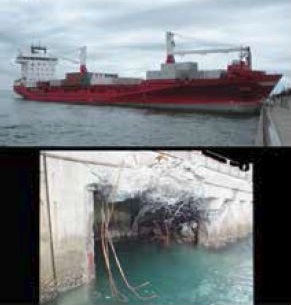Investigation: Ship Hits Seawall at 15 knots

Working while fatigued is equivalent to working while under the influence of alcohol, says Captain Paul Drouin, the editor of the Nautical Institute’s Mariners’ Alerting and Reporting Scheme (MARS) reports. The Japanese Transport Safety Board report MA2014-1 brings home the importance of adequate and continuous sleep for all crew and of keeping a proper lookout, he says.
 The report describes a small container ship that hit a seawall when the officer of the watch (OOW), alone on the bridge in the dark, fell asleep. It was the early morning hours, but still dark, and the ship was making way at about 15 knots on autopilot. The visibility was good and there was no traffic, so the master had given the instruction for the OOW to be alone on the bridge. A few hours into his watch the OOW began to feel drowsy, so he began walking briskly around the wheelhouse. He then sat in the chair in front of one of the radars, confident he would not fall asleep. However, somewhere between buoys four and five as they made landfall he fell asleep.
The report describes a small container ship that hit a seawall when the officer of the watch (OOW), alone on the bridge in the dark, fell asleep. It was the early morning hours, but still dark, and the ship was making way at about 15 knots on autopilot. The visibility was good and there was no traffic, so the master had given the instruction for the OOW to be alone on the bridge. A few hours into his watch the OOW began to feel drowsy, so he began walking briskly around the wheelhouse. He then sat in the chair in front of one of the radars, confident he would not fall asleep. However, somewhere between buoys four and five as they made landfall he fell asleep.
About 40 to 50 minutes later, at approximately 04:40, he woke up abruptly when he was thrown out of the chair by the impact of a collision. The vessel had hit the seawall on the northern side of a nearby bridge. The ship was not equipped with a bridge watch navigation alarm system (BWNAS) at the time of the accident, nor was it required to have one.
Had a proper lookout been assigned to assist the OOW it is unlikely the collision would have transpired, had he reported his drowsiness to the master, alternative watch arrangements could have been made.
Drouin says, “Although this ship was ostensibly operating under a three watch system, fatigue can affect anyone if proper ‘sleep hygiene’ is not practiced. It has been demonstrated in numerous studies that the average person needs seven to eight hours of continuous sleep for it to be truly recuperative. Working while fatigued is equivalent to working while under the influence of alcohol. Although a BNWAS is a device that can help prevent accidents like this (and today this ship would be required to have one), the real solution is proper rest for all crew and a proper lookout.”
The Mariners’ Alerting and Reporting Scheme is a confidential reporting system run by The Nautical Institute to allow full reporting of accidents (and near misses) without fear of identification or litigation, to promote lessons learned.
